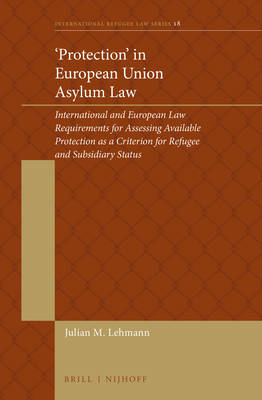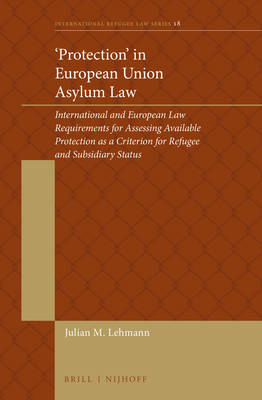
- Afhalen na 1 uur in een winkel met voorraad
- Gratis thuislevering in België vanaf € 30
- Ruim aanbod met 7 miljoen producten
- Afhalen na 1 uur in een winkel met voorraad
- Gratis thuislevering in België vanaf € 30
- Ruim aanbod met 7 miljoen producten
Zoeken
'Protection' in European Union Asylum Law
International and European Law Requirements for Assessing Available Protection as a Criterion for Refugee and Subsidiary Status
Julian Lehmann
€ 271,95
+ 543 punten
Omschrijving
Asylum law in the European Union is ripe with caveats that allow authorities to reject asylum applications due to 'protection' received in the home country or another location. But what does 'protection' mean in this context? And when is it strong enough to make denying an application lawful? Departing from the notion that refugee status is a "surrogate" for lacking protection at home, Julian M. Lehmann investigates the interplay of international law and European Union law on protection against harm by non-state actors, the Internal Protection Alternative concept, and asylum in third countries en route to the European Union. Lehmann demonstrates how conflating these concepts risks equating international protection with mere safety, which stands in contrast to the very purpose of refugee law.
Specificaties
Betrokkenen
- Auteur(s):
- Uitgeverij:
Inhoud
- Aantal bladzijden:
- 304
- Taal:
- Engels
- Reeks:
- Reeksnummer:
- nr. 18
Eigenschappen
- Productcode (EAN):
- 9789004430242
- Verschijningsdatum:
- 17/09/2020
- Uitvoering:
- Hardcover
- Formaat:
- Genaaid
- Afmetingen:
- 156 mm x 238 mm
- Gewicht:
- 589 g

Alleen bij Standaard Boekhandel
+ 543 punten op je klantenkaart van Standaard Boekhandel
Beoordelingen
We publiceren alleen reviews die voldoen aan de voorwaarden voor reviews. Bekijk onze voorwaarden voor reviews.








